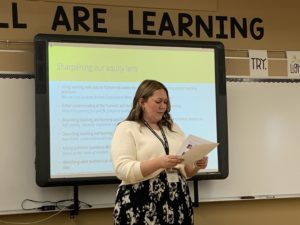 The Medford School District, in Southern Oregon, began their partnership with CEL in 2022-23 by bringing the Instructional Leadership Academy (ILA) to school principals and central office leaders. This year, they have expanded the ILA partnership to include assistant principals and new district leaders in Medford.
The Medford School District, in Southern Oregon, began their partnership with CEL in 2022-23 by bringing the Instructional Leadership Academy (ILA) to school principals and central office leaders. This year, they have expanded the ILA partnership to include assistant principals and new district leaders in Medford.
I have been working with the Medford Teaching and Learning team for the past few months to build a clear “throughline” from students who have had the fewest experiences of happiness and pride at school, to teachers, and school leaders in order to, according to the Medford Office of Teaching and Learning: “Enhance student achievement for each and every student in the Medford School District.”
Gathering non-judgmental classroom observation data, understanding the current state of teaching and learning, and giving strengths-based, actionable feedback to teachers are at the core of the ILA. The approximately 40 school and district leaders in Medford are pairing their growing instructional leadership expertise with explicit ways to sharpen their equity lens.
For example, during learning walks into select classrooms, the host school leader identifies individual students for the group to focus on to better understand the experiences of those who are less frequently happy and proud at school. In one recent learning walk, a school leader noted the frequency of student-to-student talk during a small group activity citing how one student identified by the host school leader, an English Language Learner, spoke briefly only three times while the other students spoke considerably more. Surfacing this specific data helped the school leader consider other language supports that might help in student-led, small-group discussions. At the end of the day, the school leader also committed to doing additional short observations to gain more insight into how students learning English are developing agency.
This year to better support principals and assistant principals in Medford, in addition to sponsoring the ILA work, central office leaders at the Medford School District are engaged in the AASA National Principal Supervisor Academy. Through the academy, one central office leader has partnered with a principal engaged in the ILA work to examine why Hispanic/Latino students who do not qualify for English Development classes are underperforming in reading.
These central office leaders are applying their expertise to improve outcomes for individual students and, by focusing across schools, strengthening district-wide coherence leading to better outcomes for each and every student.
